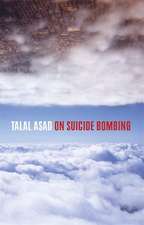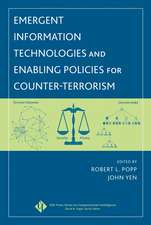Psychology of Terrorism: Classic and Contemporary Insights: Key Readings in Social Psychology
Editat de Jeff Victoroff, Arie W. Kruglanskien Limba Engleză Hardback – 24 mar 2009
Psychology of Terrorism is a collection of the best classic and contemporary writings about the mind of the terrorist. Carefully selected by a panel of world-renowned authorities for value and readability, this collection provides the reader with deep knowledge and unique insights into the ideas, feelings, and social influences of modern terrorist groups. General readers who wish to understand this deadly phenomenon, students and scholars of human psychology or political science, and decision makers facing the challenge of designing effective counterterrorism policies will enjoy and profit from these essential readings and the inescapable conclusion they suggest: By ignoring the psychology of terrorism, Western nations have been making grave errors in the so-called war on terrorism. Understanding the deep roots of terrorist behaviors gives us tools that are absolutely vital to any effort in reducing this escalating threat.
| Toate formatele și edițiile | Preț | Express |
|---|---|---|
| Paperback (1) | 384.90 lei 6-8 săpt. | |
| Taylor & Francis – 9 mar 2009 | 384.90 lei 6-8 săpt. | |
| Hardback (1) | 748.20 lei 6-8 săpt. | |
| Taylor & Francis – 24 mar 2009 | 748.20 lei 6-8 săpt. |
Din seria Key Readings in Social Psychology
- 8%
 Preț: 395.61 lei
Preț: 395.61 lei - 8%
 Preț: 408.73 lei
Preț: 408.73 lei - 20%
 Preț: 395.34 lei
Preț: 395.34 lei - 21%
 Preț: 362.24 lei
Preț: 362.24 lei - 15%
 Preț: 441.12 lei
Preț: 441.12 lei - 15%
 Preț: 507.19 lei
Preț: 507.19 lei - 15%
 Preț: 514.63 lei
Preț: 514.63 lei - 41%
 Preț: 277.14 lei
Preț: 277.14 lei - 40%
 Preț: 246.96 lei
Preț: 246.96 lei - 12%
 Preț: 328.84 lei
Preț: 328.84 lei - 15%
 Preț: 500.72 lei
Preț: 500.72 lei - 15%
 Preț: 499.25 lei
Preț: 499.25 lei - 8%
 Preț: 443.45 lei
Preț: 443.45 lei - 21%
 Preț: 361.80 lei
Preț: 361.80 lei - 21%
 Preț: 335.99 lei
Preț: 335.99 lei - 21%
 Preț: 384.90 lei
Preț: 384.90 lei - 11%
 Preț: 333.86 lei
Preț: 333.86 lei - 25%
 Preț: 828.46 lei
Preț: 828.46 lei - 25%
 Preț: 779.29 lei
Preț: 779.29 lei
Preț: 748.20 lei
Preț vechi: 1034.34 lei
-28% Nou
Puncte Express: 1122
Preț estimativ în valută:
143.19€ • 147.92$ • 119.17£
143.19€ • 147.92$ • 119.17£
Carte tipărită la comandă
Livrare economică 25 martie-08 aprilie
Preluare comenzi: 021 569.72.76
Specificații
ISBN-13: 9781841694641
ISBN-10: 1841694649
Pagini: 512
Ilustrații: 44 b/w images, 41 tables, 4 halftones and 40 line drawings
Dimensiuni: 187 x 235 x 31 mm
Greutate: 1.11 kg
Ediția:1
Editura: Taylor & Francis
Colecția Psychology Press
Seria Key Readings in Social Psychology
Locul publicării:Oxford, United Kingdom
ISBN-10: 1841694649
Pagini: 512
Ilustrații: 44 b/w images, 41 tables, 4 halftones and 40 line drawings
Dimensiuni: 187 x 235 x 31 mm
Greutate: 1.11 kg
Ediția:1
Editura: Taylor & Francis
Colecția Psychology Press
Seria Key Readings in Social Psychology
Locul publicării:Oxford, United Kingdom
Cuprins
Introduction. Part 1. What is Terrorism and How Can Psychology Explain It? Iviansky, Individual Terror: Concept and Typology. Reich, Understanding Terrorist Behavior: The Limits and Opportunities of Psychological Inquiry. Kruglanski, Fishman, The Psychology of Terrorism: “Syndrome” versus “Tool” Perspectives. Victoroff, The Mind of the Terrorist: A Review and Critique of Psychological Approaches. Part 2. Why Would One Want to Become a Terrorist? Terrorists’ Personality and Motivation. Silke, Cheshire Cat Logic: The Recurring Theme of Terrorist Abnormality in Psychological Research. Post, Sprinzak, Denny, The Terrorists in Their Own Words: Interviews with Thirty-five Incarcerated Middle Eastern Terrorists. Moghadam, Palestinian Suicide Terrorism in the Second Intifada: Motivations and Organizational Aspects. Atran, Genesis of Suicide Terrorism. Pape, The Strategic Logic of Suicide Terrorism. Pedahzur, Perliger, Weinberg, Altruism and Fatalism: The Characteristics of Palestinian Suicide Terrorists. Part 3. Why Would One Want to Become a Terrorist? Possible Economic or Political Origins of Terrorism. Krueger, Maleckova, Does Poverty Cause Terrorism? Li, Does Democracy Promote or Reduce Transnational Terrorist Incidents? Reinares, Who are the Terrorists? Analyzing Changes in Sociological Profile among Members of ETA. Part 4. Why Would Terrorists Enjoy Wide Popular Support? Levin, Henry, Pratto, Sidanius, Social Dominance and Social Identity in Lebanon: Implications for Support of Violence Against the West. Sidanius, Henry, Pratto, Levin, Arab Attributions for the Attack on America: The Case of Lebanese Subelites. Pyszczynski, Abdollahi, Solomon, Greenberg, Cohen, Weise, Mortality Salience, Martyrdom, and Military Might: The Great Satan Versus the Axis of Evil. Part 5. How Does One Become a Terrorist? Social and Psychological Factors in Terrorism. della Porta, Recruitment Processes in Clandestine Political Organizations: Italian Left-wing Terrorism. Sprinzak, The Psychopolitical Formation of Extreme Left Terrorism in a Democracy: The Case of the Weathermen. McCauley, Segal, Social Psychology of Terrorist Groups. Merari, Friedland, Social Psychological Aspects of Political Terrorism. Sageman, Understanding Terror Networks. Part 6. Is Terrorism Rational? A Logical Perspective. Crenshaw, The Logic of Terrorism: Terrorist Behavior as a Product of Strategic Choice. Sandler, Tschirhart, Cauley, A Theoretical Analysis of Transnational Terrorism. Part 7. Is Terrorism Evil? Wardlaw, Justifications and Means: The Moral Dimension of State-sponsored Terrorism. Juergensmeyer, Islam’s “Neglected Duty”. Part 8. How Can Terrorism Be Overcome? Atran, Soft Power and the Psychology of Suicide Bombing. Hafez, Hatfield, Do Targeted Assassinations Work? A Multivariate Analysis of Israel’s Controversial Tactic During Al-Aqsa Uprising. Kaplan, Mintz, Mishal, Samban, What Happened to Suicide Bombings in Israel? Insights from a Terror Stock Model.
Notă biografică
Jeff Victoroff began his career in academic medicine. After training in Neurology and Psychiatry at Harvard and a fellowship in Neurobehavior at UCLA, he joined the faculty of the University of Southern California Keck School of Medicine. His initial research focused on neurodegeneration and on the reasons for aggression seen in patients with neurological disorders. After 9/11 he made a dramatic change in his research career to study the deep causes of human aggression, including both individual and collective violence, from a transdisciplinary perspective.
Arie W. Kruglanski is a Distinguished University Professor at the University of Maryland and one of the most cited researchers in Social Psychology. His interests have centered on the psychology of judgment and knowledge formation, as well as on the processes of group decision making, goal formation and implementation. He has served as Editor of the Journal of Personality and Social Psychology: Attitudes and Social Cognition and the Personality and Social Psychology Bulletin. Among other distinctions, he has received the Donald T. Campbell Award for Distinguished Scientific Contribution to Social Psychology, the Humboldt Foundation Life Achievement Award (Forschungpreis), and the NIMH Research Scientist Award Ko5. His publications include over 180 scientific literature articles, chapters, and books on social personality psychology.
He is Editor of two Psychology Press series: Key Readings in Social Psychology and Principles of Social Psychology; and a co-editor of a series of upper-level texts called Frontiers of Social Psychology.
Arie W. Kruglanski is a Distinguished University Professor at the University of Maryland and one of the most cited researchers in Social Psychology. His interests have centered on the psychology of judgment and knowledge formation, as well as on the processes of group decision making, goal formation and implementation. He has served as Editor of the Journal of Personality and Social Psychology: Attitudes and Social Cognition and the Personality and Social Psychology Bulletin. Among other distinctions, he has received the Donald T. Campbell Award for Distinguished Scientific Contribution to Social Psychology, the Humboldt Foundation Life Achievement Award (Forschungpreis), and the NIMH Research Scientist Award Ko5. His publications include over 180 scientific literature articles, chapters, and books on social personality psychology.
He is Editor of two Psychology Press series: Key Readings in Social Psychology and Principles of Social Psychology; and a co-editor of a series of upper-level texts called Frontiers of Social Psychology.
Recenzii
“Despite its obvious relevance, until recently psychology has had a relatively small footprint in the study of terrorism. This large volume by two well-established researchers, Jeff Victoroff (a psychiatrist) and Arie Kruglanski (a psychologist), may go far in changing that. The editors have assembled 28 readings on the psychology of terrorism that explore all things psychological, from motivation and intent, to rational aspects of terrorism, to strategies for countering terrorists. They strike a nice balance between classics and important recent contributions.” - Gary LaFree, Director, National Consortium for the Study of Terrorism and Responses to Terrorism (START), University of Maryland
“Despite its obvious relevance, until recently psychology has had a relatively small footprint in the study of terrorism. This large volume by two well-established researchers, Jeff Victoroff (a psychiatrist) and Arie Kruglanski (a psychologist), may go far in changing that. The editors have assembled 28 readings on the psychology of terrorism that explore all things psychological, from motivation and intent, to rational aspects of terrorism, to strategies for countering terrorists. They strike a nice balance between classics and important recent contributions.” - Gary LaFree, Director, National Consortium for the Study of Terrorism and Responses to Terrorism (START), University of Maryland
"One of the most important contributions of this volume is its educational value. In fact, this volume could serve as the basis for a course on the psychology of terrorism, both in terms of content and structure (which could be used to organize a semester-long course). Perhaps the key strength of this volume is its central emphasis on the importance of the person/situation interaction. The volume marks a distinct advance for curricula and pedagogy in the psychology of terrorism, and may serve to establish it as more of a standard area of research and teaching for social psychologists". - Lemieux, Anthony F. (2009), Review of Psychology of Terrorism: Classic and Contemporary Insights. The Journal of Social Psychology, 149(5) 606-608
“Despite its obvious relevance, until recently psychology has had a relatively small footprint in the study of terrorism. This large volume by two well-established researchers, Jeff Victoroff (a psychiatrist) and Arie Kruglanski (a psychologist), may go far in changing that. The editors have assembled 28 readings on the psychology of terrorism that explore all things psychological, from motivation and intent, to rational aspects of terrorism, to strategies for countering terrorists. They strike a nice balance between classics and important recent contributions.” - Gary LaFree, Director, National Consortium for the Study of Terrorism and Responses to Terrorism (START), University of Maryland
"One of the most important contributions of this volume is its educational value. In fact, this volume could serve as the basis for a course on the psychology of terrorism, both in terms of content and structure (which could be used to organize a semester-long course). Perhaps the key strength of this volume is its central emphasis on the importance of the person/situation interaction. The volume marks a distinct advance for curricula and pedagogy in the psychology of terrorism, and may serve to establish it as more of a standard area of research and teaching for social psychologists". - Lemieux, Anthony F. (2009), Review of Psychology of Terrorism: Classic and Contemporary Insights. The Journal of Social Psychology, 149(5) 606-608
Descriere
Psychology of Terrorism is a definitive collection of classic and contemporary writings about the mind of the terrorist. Selected by a panel of world-renowned authorities, this collection provides the reader with knowledge and insight into the ideas and influences of modern terrorist groups.















